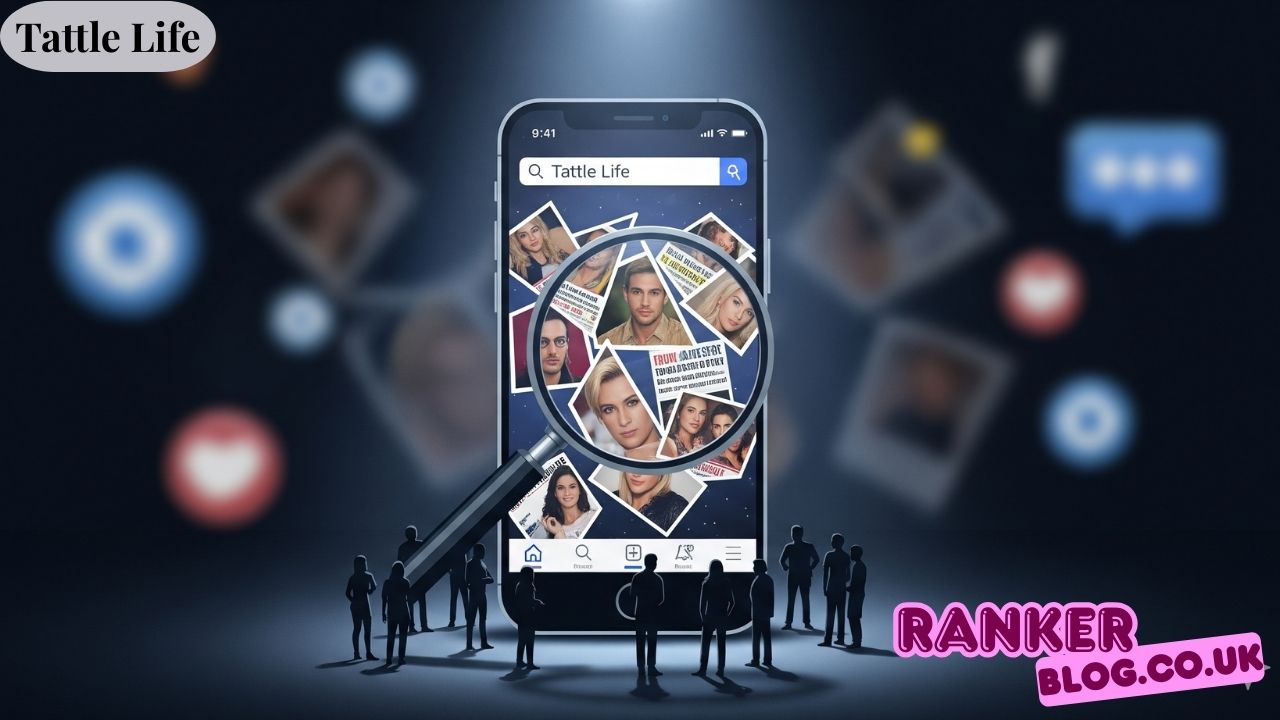What Is Tattle Life and Why Does It Matter?
Tattle Life represents one of the most controversial online platforms in today’s digital landscape. This anonymous commentary website has sparked intense debates about the boundaries between legitimate criticism and online harassment. Understanding what Tattle Life actually does and why it generates so much discussion is essential for anyone interested in modern internet culture and influencer accountability.
The platform operates as an online forum where users can discuss public figures who monetise their personal lives through social media. Since its launch in 2018, Tattle Life has grown into a significant force in online discourse, accumulating over 22 million messages across more than 47,000 discussion threads. The platform’s operators claim to maintain a 24/7 moderation team to oversee content.
The Origins and Foundation of Tattle Life
How Tattle Life Started
Tattle Life began its journey in 2018 under the pseudonym “Lime Goss,” later revealed to be Helen McDougal. However, subsequent investigations uncovered that the platform was actually operated by Sebastian Bond, who used the alias Bastian Durward. The initial vision was to create a space where users could critique influencers and public figures who commercialise their personal lives for profit.
The platform’s creators positioned it as a necessary counterbalance to the often uncritical coverage that social media personalities receive elsewhere online. They argued that traditional media outlets rarely provided honest assessments of influencer behaviour, leaving a gap that Tattle Life aimed to fill.
Platform Structure and Design
Tattle Life operates using a classic forum format that allows anonymous users to participate in discussions. The platform organises conversations into thread-based discussions focused on specific individuals, with each thread dedicated to ongoing commentary about a particular public figure’s activities and behaviour.
Unlike mainstream celebrity gossip sites that focus on A-list celebrities, Tattle Life primarily targets micro-influencers and smaller social media personalities. This focus on lesser-known figures has been both praised for holding accountability for emerging influencers criticised for targeting vulnerable individuals who may not have the resources to defend themselves.
Understanding Tattle Life’s Target Subjects and Content Focus

Primary Areas of Discussion
The platform concentrates on several key categories of public figures. Micro-influencers and social media personalities represent the largest segment of discussed individuals, particularly those who have built their brands around personal lifestyle content. Content creators who monetise their family life, wellness routines, and daily activities often find themselves subjects of lengthy discussion threads.
Public figures in lifestyle, family, and wellness niches receive particular attention on the platform. This includes family vloggers, fitness influencers, and lifestyle coaches who share intimate details of their lives while promoting products or services to their followers.
Notable Subjects and Cases
Several high-profile cases have brought Tattle Life into the public spotlight. The platform has hosted extensive discussions about various influencers, with some threads accumulating thousands of posts over months or years. Tattle Life Becki Jones discussions, for instance, have generated significant attention, highlighting how the platform focuses on specific individuals who have built substantial online followings.
Katie Price has also been a subject of discussion on the platform. Tattle Life Katie Price threads demonstrate how the platform covers both established celebrities and emerging social media personalities, though the focus remains primarily on those who monetise their personal lives through social media platforms.
The platform has also seen discussions about various TikTok personalities. Tattle Life TikTok conversations often centre around creators who have gained substantial followings and begun monetising their content through brand partnerships and sponsored posts.
Stephanie Vavron represents another example of how the platform targets specific content creators. Tattle Life Stephanie Vavron discussions show the platform’s focus on individuals who share personal stories and lifestyle content while building commercial enterprises around their online presence.
Types of Content and Discussions
Platform discussions typically fall into several categories. Commentary on social media posts and behaviour forms the core of most threads, with users analysing everything from caption choices to video content decisions. Users frequently discuss what they perceive as inconsistencies or inauthentic behaviour in influencer content.
Business practice analysis represents another significant discussion type. Users examine how influencers promote products, disclose partnerships, and handle commercial relationships with their audiences. These conversations often focus on transparency issues and potential regulatory violations.
Personal lifestyle choices and family decisions also generate extensive commentary. Users discuss parenting decisions, relationship dynamics, and lifestyle choices that influencers share publicly, often expressing strong opinions about these personal matters.
Controversies and Criticisms Surrounding Tattle Life

The Nature of Platform Content
Critics argue that Tattle Life often crosses the line from legitimate criticism into harassment territory. The platform’s anonymous nature allows users to make statements without accountability, which can lead to particularly harsh or unfair commentary about the subjects being discussed.
Discussions can become highly critical and toxic, especially when focusing on vulnerable individuals or sensitive personal matters. The cumulative effect of sustained negative commentary can be overwhelming for the subjects, who may find themselves facing criticism about every aspect of their public and private lives.
The anonymous posting system creates an environment where users feel emboldened to make statements they might not make under their real names. This dynamic can encourage more extreme positions and personal attacks rather than constructive criticism.
Mental Health and Psychological Impact
Mental health advocates have raised serious concerns about Tattle Life’s impact on the individuals being discussed. The constant scrutiny and criticism can contribute to anxiety, depression, and other psychological issues for those targeted by platform discussions.
The platform’s subjects often report feeling overwhelmed by the volume and intensity of criticism they face. Some have described the experience as having every aspect of their lives analysed and judged by anonymous strangers, creating significant stress and anxiety.
The cumulative effect of sustained criticism can be particularly damaging. Unlike traditional media coverage that might focus on specific incidents, Tattle Life discussions can continue for months or years, creating an ongoing source of stress for the individuals involved.
Public Perception and Debate
Public opinion about Tattle Life remains deeply divided. Supporters argue that the platform provides necessary accountability for influencers who profit from sharing their personal lives, contending that public figures should expect public scrutiny.
Critics counter that the platform enables cyberbullying and harassment, arguing that the anonymous nature and lack of editorial oversight create an environment where abuse can flourish unchecked. They point to instances where discussions have become personally vindictive rather than focusing on legitimate concerns about influencer behaviour.
The debate often centres on where to draw the line between legitimate criticism and harassment. While few people argue that public figures should be immune from criticism, many question whether the intensity and personal nature of Tattle Life discussions cross ethical boundaries.
Legal Challenges and Court Cases

Landmark Legal Cases
Tattle Life faced significant legal challenges in 2025 when Neil and Donna Sands, Northern Irish entrepreneurs, successfully sued the platform over defamatory content. The couple was awarded £300,000 in damages after a 45-page thread targeting them had remained active since 2021.
This case marked a turning point in legal accountability for anonymous online platforms. The High Court lifted reporting restrictions in June 2025, publicly identifying Sebastian Bond as the platform’s operator and establishing important precedents for future online defamation cases.
The legal proceedings were entirely funded by the plaintiffs at their own cost, demonstrating the financial commitment required to pursue justice against anonymous online harassment. The case showed that determined individuals could hold anonymous platforms accountable for defamatory content.
Legal Precedents and Implications
The successful defamation case established several important legal precedents. It demonstrated that anonymous posting does not guarantee legal immunity and that platform operators can be held responsible for defamatory content hosted on their sites.
The case also highlighted that causing distress through online harassment and bullying constitutes unlawful behaviour, regardless of whether the platform claims to moderate content. This precedent has implications for similar platforms and may encourage more victims to pursue legal remedies.
The legal victory has had broader implications for online forum operations and moderation practices. It suggests that platforms cannot simply rely on user-generated content disclaimers to avoid responsibility for harmful material hosted on their sites.
Platform Changes and Response to Legal Pressure
Rebranding and Operational Changes
Following legal challenges, Tattle Life underwent several changes. User reports indicate that the platform changed overnight into “8Cafe,” apparently attempting to distance itself from negative publicity associated with the Tattle Life name.
These rebranding attempts reflect efforts to continue operations while avoiding some of the legal and public relations problems that have plagued the original platform. Domain and name changes following legal challenges suggest ongoing efforts to maintain the platform while reducing legal exposure.
Moderation and Community Response
The platform’s operators have consistently claimed to maintain a zero-tolerance policy for abusive content, supported by a 24/7 moderation team. However, questions persist about the effectiveness of these moderation practices, particularly given the successful defamation case that resulted in significant damages.
Community response to legal challenges has been mixed. Some users have defended the platform as providing legitimate criticism of public figures, while others have acknowledged that some content and behaviour crosses appropriate boundaries.
The legal challenges have forced discussions within the community about the difference between legitimate criticism and harassment. Some users have called for more responsible posting practices, while others have argued that any restrictions would undermine the platform’s purpose.
Impact on Influencer Culture and Digital Accountability
Effects on Content Creators
The legal challenges and ongoing controversies surrounding Tattle Life have had significant effects on the broader influencer ecosystem. While the platform’s activities have created anxiety for many content creators, they have also empowered some creators to pursue legal remedies against online harassment.
Many influencers have become more aware of their legal options when facing online harassment. The successful defamation case has shown that legal action against anonymous harassment is possible, encouraging other victims to consider similar approaches.
However, there are concerns about potential chilling effects on content creation. Some creators may become more cautious about sharing personal information or expressing authentic opinions if they fear becoming targets of sustained criticism.
Industry and Regulatory Response
The influencer industry has increasingly focused on accountability and protection measures. There are growing calls for better protection of public figures from harassment, while maintaining space for legitimate criticism of commercial practices and public behaviour.
The balance between criticism and abuse remains a central challenge. Industry discussions increasingly focus on developing frameworks that allow for accountability while preventing harassment and personal attacks.
Regulatory implications continue to evolve. There is potential for increased regulation of anonymous forums, with questions about platform responsibility for user content becoming more pressing as legal precedents develop.
The Broader Context of Anonymous Online Culture
Digital Accountability and Responsibility
Tattle Life exists within a broader phenomenon of anonymous criticism platforms that reflect ongoing tensions between free speech and harassment protection. The platform raises fundamental questions about digital accountability and responsibility in online spaces.
The anonymous nature of internet culture has created new challenges for balancing legitimate criticism with protection from harassment. Traditional notions of accountability and editorial oversight do not easily translate to user-generated content platforms.
Comparison to Traditional Media
There are both similarities and differences between Tattle Life and traditional tabloid coverage. Like traditional gossip media, the platform focuses on the personal lives and controversial behaviour of public figures. However, the anonymous nature and lack of editorial oversight create different dynamics.
Traditional media outlets, despite their flaws, typically have editorial processes, legal review, and accountability structures that anonymous forums lack. This difference in accountability creates different standards for content and different protections for subjects.
Current Status and Future Implications
Ongoing Legal and Operational Challenges
The successful defamation case continues to impact Tattle Life’s operations and reputation. There is potential for additional legal challenges as more individuals become aware of their legal options for addressing online harassment.
Changes in platform operation and policies may be necessary to address legal vulnerabilities highlighted by recent court cases. The platform faces ongoing questions about its long-term sustainability, given legal and public relations challenges.
Precedent for Similar Platforms
The legal victory against Tattle Life has established a model for pursuing legal action against anonymous harassment platforms. This precedent has implications for other gossip and criticism forums that operate using similar models.
The case demonstrates that determined individuals can successfully challenge anonymous online harassment through legal action. This precedent may encourage more people to pursue legal remedies while also prompting platforms to implement stronger moderation and content policies.
Lessons and Future Considerations
Digital Culture and Online Accountability
Tattle Life represents broader tensions in online discourse about accountability, criticism, and harassment. The platform highlights the challenges of anonymous platforms and demonstrates the evolution of legal approaches to cyberbullying and online harassment.
The importance of legal accountability in digital spaces has become increasingly clear. The successful defamation case shows that legal remedies exist for online harassment, even when it occurs on anonymous platforms.
Balance Between Criticism and Protection
The ongoing debate about Tattle Life reflects broader challenges in balancing legitimate criticism with protection from harassment. Digital platforms must navigate complex questions about free speech, accountability, and harm prevention.
The evolution of online accountability mechanisms continues to develop through legal precedents, platform policies, and cultural changes. The Tattle Life case represents an important step in establishing clearer boundaries and consequences for online harassment.
Platform responsibility for content moderation remains a central issue. The legal challenges faced by Tattle Life suggest that platforms cannot simply disclaim responsibility for user-generated content that causes harm to individuals.
The future of online discourse will likely involve continued evolution of legal frameworks, platform policies, and cultural norms around digital accountability. The Tattle Life case provides important lessons about the limits of anonymous criticism and the importance of protecting individuals from online harassment while maintaining space for legitimate public discourse.
Also Read: Understanding the Mystery of lño Decoding an Internet Enigma

